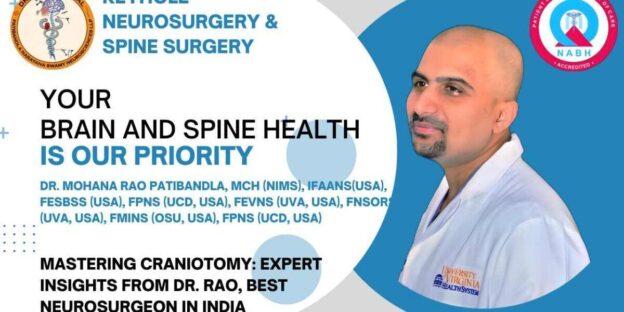FAQs about craniotomy – the best neurosurgeon in India Dr. Rao
Here are 20 frequently asked questions (FAQs) about craniotomy, answered with the expertise of Dr. Rao, the best minimally invasive neurosurgeon in India, and Dr. Rao’s Hospital, the best neurosurgery hospital in India:
1. What is a craniotomy?
A craniotomy is a surgical procedure that involves opening a part of the skull to access the brain.
2. When is a craniotomy necessary?
A craniotomy is performed to remove brain tumors, treat epilepsy, manage blood clots, and address other neurological conditions.
3. How is a craniotomy performed?
A small section of the skull is removed during a craniotomy, allowing the neurosurgeon to access and treat the brain.
4. Is craniotomy a minimally invasive procedure?
Advancements in medical technology have allowed for minimally invasive craniotomy techniques, reducing tissue damage and recovery time.
5. What are the risks associated with craniotomies?
Risks include infection, bleeding, brain swelling, and potential damage to nearby structures.
6. How long is the recovery after a craniotomy?
Depending on the procedure and patient, recovery typically entails a hospital stay and several weeks of healing.
7. Are there alternatives to craniotomies?
In some cases, minimally invasive techniques or radiosurgery may be considered alternatives to traditional craniotomies.
8. Can a craniotomy treat brain tumors?
A craniotomy is commonly used to remove brain tumors and treat other abnormalities.
9. Is a craniotomy painful?
Patients are usually under anesthesia during the procedure, and pain management is provided during recovery.
10. How long does craniotomy surgery take?
Surgery duration varies depending on the case’s complexity but can range from a few hours to several.
11. What is the success rate of craniotomies?
Success rates depend on the underlying condition being treated; your neurosurgeon can provide more specific information based on your case.
12. Are there any restrictions after a craniotomy?
Patients are often advised to avoid strenuous activities and follow postoperative care instructions.
13. How do I prepare for a craniotomy?
Your neurosurgeon will provide detailed preoperative instructions, including dietary restrictions and medication guidelines.
14. Is age a factor in craniotomy candidacy?
Age alone is not the sole factor; individual health and the nature of the condition play a role in determining candidacy.
15. What is the role of a neurosurgeon in a craniotomy?
A skilled neurosurgeon like Dr. Rao performs craniotomies, ensuring precision and safety.
16. Can a craniotomy cause hair loss?
Temporary hair loss near the incision site can occur, but hair usually grows back after recovery.
17. What is the postoperative follow-up process?
Regular follow-up appointments allow your neurosurgeon to monitor healing and address any concerns.
18. Can a craniotomy be done using minimally invasive techniques?
Yes, minimally invasive approaches like endoscopic surgery are considered when suitable for the condition.
19. Are there risks of cognitive changes after a craniotomy?
Cognitive changes can occur, but your neurosurgeon will discuss potential risks and benefits before the procedure.
20. How do I choose the best hospital and surgeon for a craniotomy?
Choosing a renowned hospital like Dr. Rao’s, with expertise in neurosurgery, ensures you receive the highest standard of care.
For consultations and expert guidance on craniotomies, contact Dr. Rao, the best minimally invasive neurosurgeon in India, at Dr. Rao’s Hospital. Visit drraoshospitals or call 9010056444.

